Health
Anti-Puberty Pill
In 1969, British health officer Dr. J.V. Walker proposed the development of a pill "to give young people to delay the onset of sexual maturity until they leave college and could earn their own living." Walker felt certain "it should not be difficult to develop a hormone preparation for the job."Such a pill would certainly change the college experience for most people.

Akron Beacon Journal - June 1, 1969
A bit of research revealed that this J.V. Walker was Joseph V. Walker, health officer of Darlington. I couldn't find a fuller description of his anti-puberty pill, but I did come across a letter he sent to the Health Education Journal (March 1, 1970) in which he worried that young women would develop into "promiscuous addicts" if they didn't preserve their virginity until marriage. I suppose his pill would help with that goal as well.
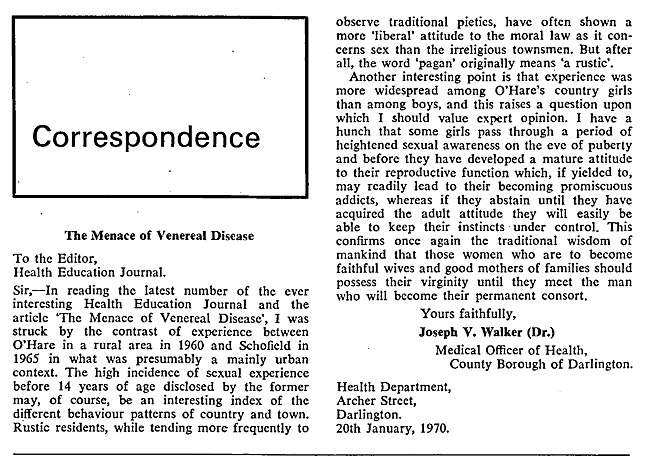
Posted By: Alex - Tue Mar 13, 2018 -
Comments (10)
Category: Health, 1960s, Universities, Colleges, Private Schools and Academia
Washroom Infection
In the early 20th century, it was widely believed that dirty bathrooms were a primary cause of the spread of disease, particularly sexual disease. One result of this belief, apparently, was the adoption of U-shaped toilet seats in public bathrooms, since it was thought that these were more hygienic.Read more about this at The Weeklings.
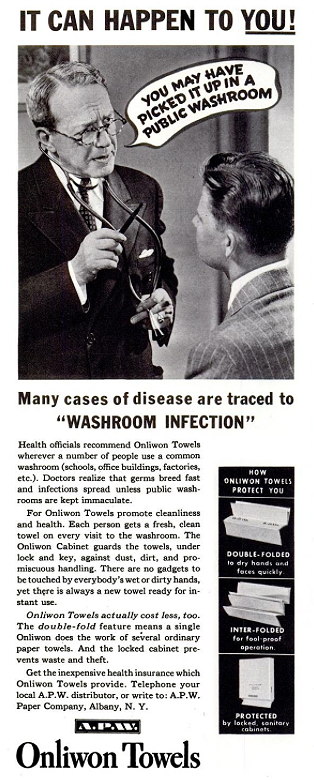
Posted By: Alex - Fri Feb 02, 2018 -
Comments (7)
Category: Health, Disease, Hygiene, Advertising, 1930s
LadyCare Menopause Magnets
The manufacturers of LadyCare Magnets claim that women can ease the symptoms of menopause by magnetizing their underwear.I guess it can't hurt, but might look a bit odd if random metallic objects (forks, paperclips, etc.) are attracted to your crotch.
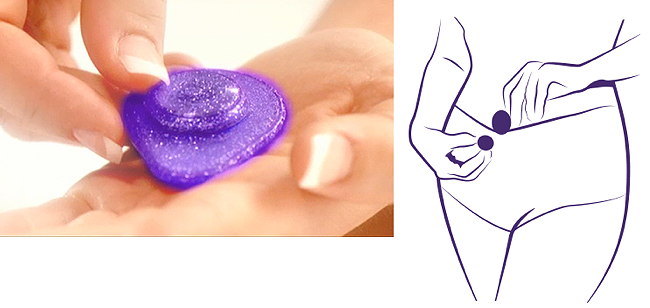
Posted By: Alex - Tue Jan 02, 2018 -
Comments (4)
Category: Health, Underwear
Showgirls With Hiccups
Posted By: Paul - Tue Sep 12, 2017 -
Comments (4)
Category: Health, 1960s, Screams, Grunts and Other Exclamations
Toilet Tissue Illness
In the late 1920s and early 1930s, Scott Tissues ran an advertising campaign that sought to convince the American public that there was such a thing as 'Toilet Tissue Illness,' and that it was one of the great public health crises of the time. Toilet Tissue Illness was caused by using cheap toilet paper. It could lead to serious complications, possibly requiring rectal surgery to fix. So the ads suggested.The most notorious ad in the campaign was the 'black glove' ad below.
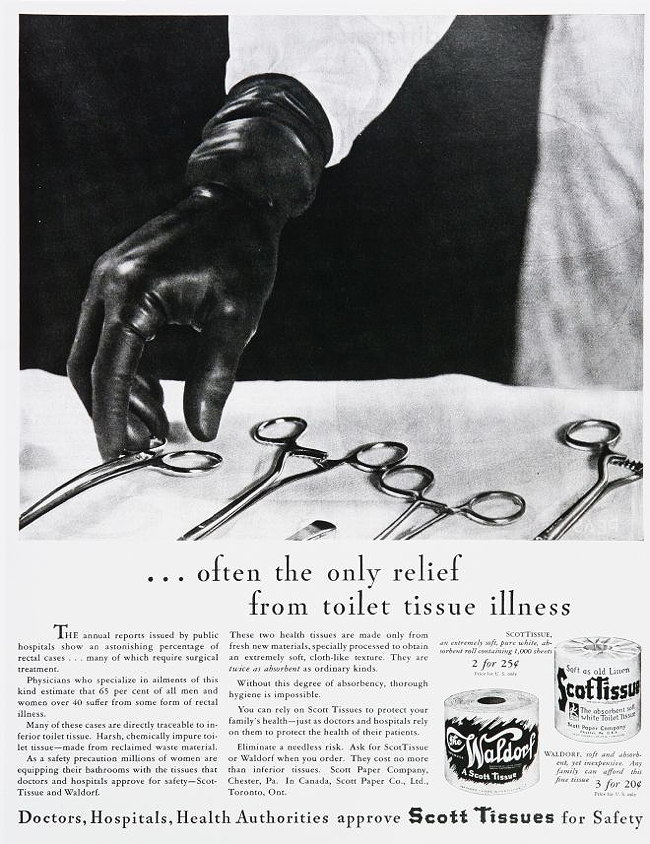
Here's some background info about the Scott Tissue campaign from Richard Smyth's Bum Fodder: An Absorbing History of Toilet Paper:
And a few of the other ads featured in the campaign:
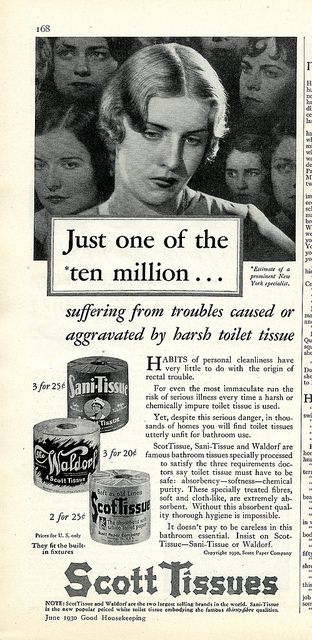
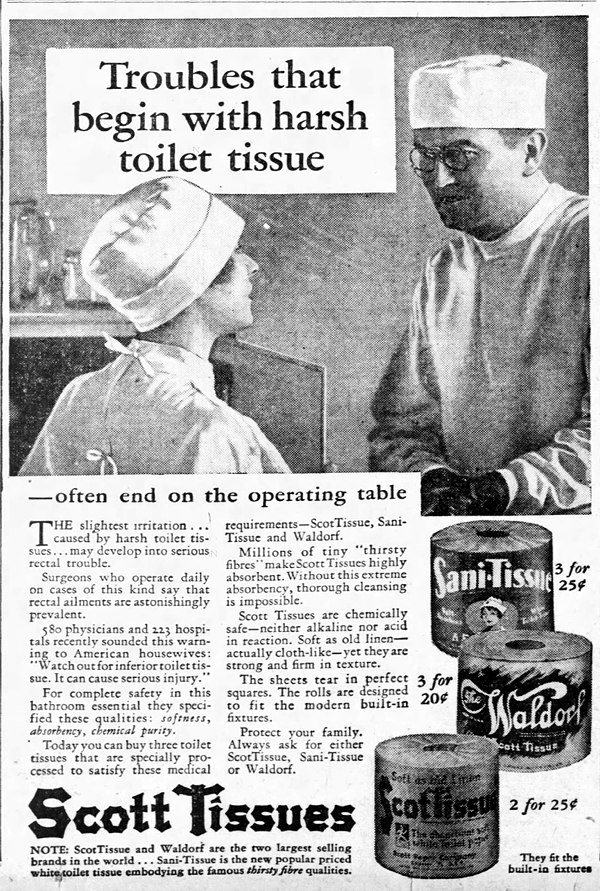
Posted By: Alex - Thu Jul 20, 2017 -
Comments (4)
Category: Health, Advertising, 1920s, 1930s
Caffeinism
March 1985: Sgt. Joseph Mitlof of the NYPD realized that the 30 cups of coffee a day he was drinking might have been contributing to his anxiety problems. In fact, he was suffering from "caffeinism."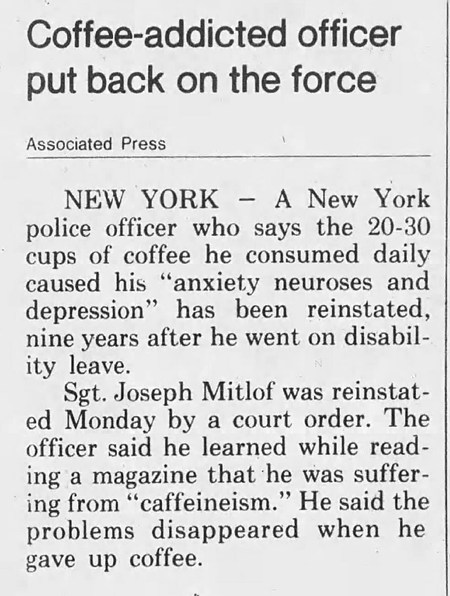
Tallahassee Democrat - Mar 20, 1985
I had never heard of such a thing as "caffeinism," but it turns out the term is over 100 years old. A 1979 article in the Journal of Applied Behavior Analysis offered the following definition:
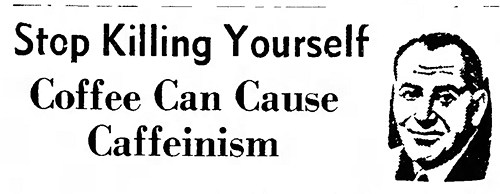
Burlington Daily Times - Mar 5, 1968
I only drink one cup of coffee a day, first thing in the morning. I think I'm good.
Posted By: Alex - Mon Jun 19, 2017 -
Comments (3)
Category: Drugs, Health
Allergic to wife
1966: After suffering from asthma for 15 years, Sigurd Lindh learned that he was allergic to his wife, Greta. He moved into a cabin 600 yards from their home, and his asthma cleared up.It's pretty rare for spouses to be allergic to each other (as in, actually having a physical reaction to the other's presence, not just hating each other's guts). But it's doubly rare for a husband to be allergic to a wife. So Lindh was pretty unique. For whatever reason, the overwhelming majority of these spousal allergy cases involve wives allergic to their husbands. See here and here.
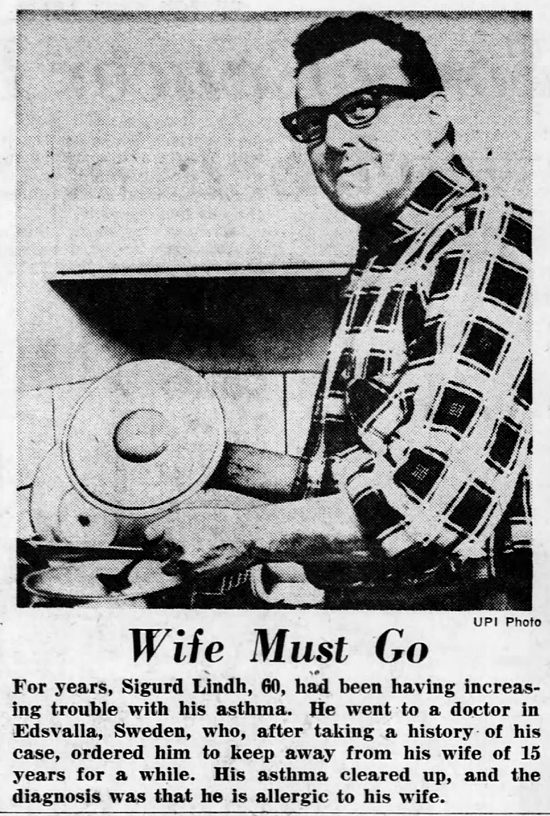
Detroit Free Press - June 2, 1966

Akron Beacon Journal - Sep 12, 1966
Posted By: Alex - Tue Apr 18, 2017 -
Comments (1)
Category: Health, Marriage, 1960s
Mudlavia
Miracle mud cures!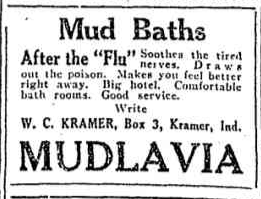
Wikipedia page.

Great article with primary source material here.
Posted By: Paul - Tue Apr 04, 2017 -
Comments (0)
Category: Architecture, Fads, Health, Regionalism, Natural Resources, Nineteenth Century
The Hand Drop Test

Steve notes that the test is remarkably reliable, and the reason this is so is because:
However, he warns that there are patients who have "played the game before" and may be able to fake a convincing response even to the hand drop test. In an article on "Faking Unconsciousness" in the journal Anaesthesia (April 2000), the author noted:
Posted By: Alex - Tue Mar 14, 2017 -
Comments (2)
Category: Health
Sneeze cured deafness
1973: Jean Haynes was almost deaf since birth, but then an allergic reaction triggered a bout of sneezing. Seems that she sneezed quite a bit. But finally, she gave one big sneeze, and suddenly she could hear again.This falls into the recurring weird news theme of accidental cures (such as people who get hit in the head and are cured of blindness).
But I'm also reminded of the cases of people who blew their nose and had an eye fell out.
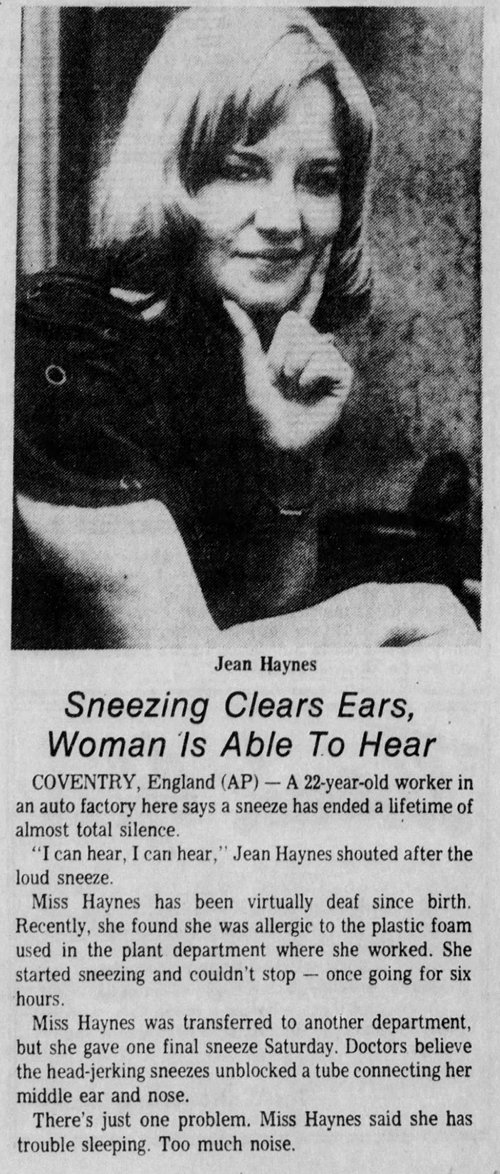
La Crosse Tribune - Jan 9, 1973
COVENTRY, England (AP) — A 22-year-old worker in an auto factory here says a sneeze has ended a lifetime of almost total silence.
"I can hear, I can hear," Jean Haynes shouted after the loud sneeze.
Miss Haynes has been virtually deaf since birth. Recently, she found she was allergic to the plastic foam used in the plant department where she worked. She started sneezing and couldn't stop — once going for six hours.
Miss Haynes was transferred to another department, but she gave one final sneeze Saturday. Doctors believe the head-jerking sneezes unblocked a tube connecting her middle ear and nose.
There's just one problem. Miss Haynes said she has trouble sleeping. Too much noise.
Posted By: Alex - Mon Feb 13, 2017 -
Comments (6)
Category: Health, 1970s

| Who We Are |
|---|
| Alex Boese Alex is the creator and curator of the Museum of Hoaxes. He's also the author of various weird, non-fiction, science-themed books such as Elephants on Acid and Psychedelic Apes. Paul Di Filippo Paul has been paid to put weird ideas into fictional form for over thirty years, in his career as a noted science fiction writer. He has recently begun blogging on many curious topics with three fellow writers at The Inferior 4+1. Contact Us |




